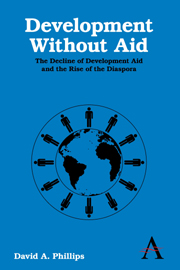Book contents
- Frontmatter
- Contents
- List of Acronyms
- Acknowledgments
- 1 Introduction: Motivation and Perspective
- 2 What Is Foreign Aid, Who Does It, Why and How Much Is There?
- 3 How Far Has Development Aid Been Effective?
- 4 Why Has Development Aid Done So Little?
- 5 Changing the Dynamics of Development
- 6 “New Aid”: New Ways to Promote and Finance Development?
- 7 Another Pathway Out of Poverty?
- 8 Exit Strategy – Replacing Foreign Assistance
- 9 Postscript
- Notes
- Index
5 - Changing the Dynamics of Development
Published online by Cambridge University Press: 05 July 2013
- Frontmatter
- Contents
- List of Acronyms
- Acknowledgments
- 1 Introduction: Motivation and Perspective
- 2 What Is Foreign Aid, Who Does It, Why and How Much Is There?
- 3 How Far Has Development Aid Been Effective?
- 4 Why Has Development Aid Done So Little?
- 5 Changing the Dynamics of Development
- 6 “New Aid”: New Ways to Promote and Finance Development?
- 7 Another Pathway Out of Poverty?
- 8 Exit Strategy – Replacing Foreign Assistance
- 9 Postscript
- Notes
- Index
Summary
Donors and African governments together have in effect undermined capacity in Africa: they are undermining it faster than they are building it.
Edward V. K. Jaycox (1993)Ultimately it is Africans, wherever we reside, who will effect the transformation that we all seek for our continent. … Africa's diaspora is finding new and sustainable ways of returning its skills and training to Africa.
Francis Williams (2009)A Prospect for Change?
In Chapter 1, I suggested that what was needed to bring the one billion poorest of the poor on to a growth path was radical change. This statement was not a call for revolution but rather to draw a stark contrast with the incrementalism and low expectations associated with the aid industry over 50 years, so low in some cases that one might well think that there was a hidden agenda, to do nothing but appear to be doing something. In the case of some donor nations that see aid simply as an exercise in political influence this surely applies.
In the last chapter, it was suggested that the failures of development aid in the hardcore poor countries cannot be explained by a host of factors that are currently deployed to explain them. These include: the lack of good impact evaluation techniques; the corrupt practices of local civil servants and politicians; the lack of buy-in by government and business to the assistance approach of aid donors; the lack of ownership of these same programs by the recipient “beneficiaries”; the weakness of capacity within government.
- Type
- Chapter
- Information
- Development without AidThe Decline of Development Aid and the Rise of the Diaspora, pp. 103 - 140Publisher: Anthem PressPrint publication year: 2013



